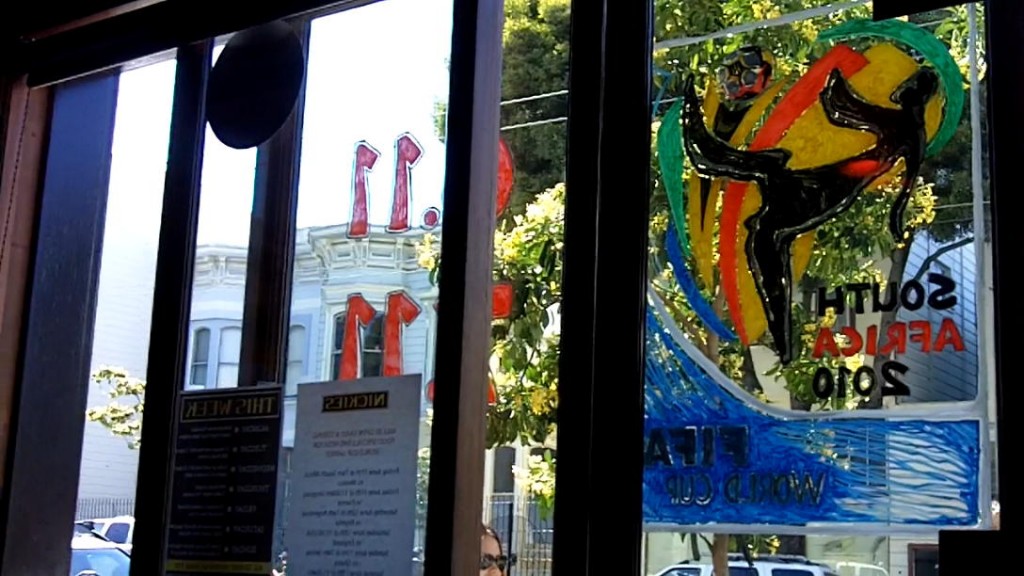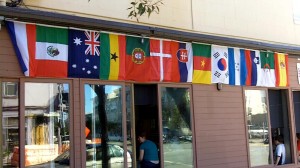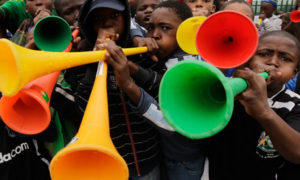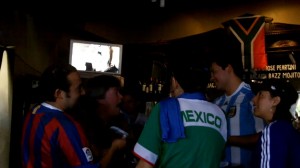 1. U.S. interest in the tournament, which has been growing slowly since we hosted in 1994, has accelerated. ESPN is showing every match in spite of the time differential. Locally, San Francisco had the second-highest U.S. city rating for the match against England (11.2, second to San Diego’s 11.5). That is lower than this year’s U.S.-Canada Olympic gold medal hockey game (15.9 in SF) but the Cup is a social event and it was absurdly good weather yesterday so there was much more buzz in town for the soccer than for hockey in February, including well-attended open-air presentations of the game at both the baseball stadium and the plaza at City Hall.
1. U.S. interest in the tournament, which has been growing slowly since we hosted in 1994, has accelerated. ESPN is showing every match in spite of the time differential. Locally, San Francisco had the second-highest U.S. city rating for the match against England (11.2, second to San Diego’s 11.5). That is lower than this year’s U.S.-Canada Olympic gold medal hockey game (15.9 in SF) but the Cup is a social event and it was absurdly good weather yesterday so there was much more buzz in town for the soccer than for hockey in February, including well-attended open-air presentations of the game at both the baseball stadium and the plaza at City Hall.
2. The World Cup is bigger than anyone. Except Maradona. TV cameras showed the Argentine legend-coach more than world star Lionel Messi, eternally damned Robert Green or any other single person this weekend, and that’s not including any youTube videos of Maradona using his royalty toilet (please, no hand of God jokes). Also, he must have set a record for touches by a coach. I counted six times he kicked the ball back into play. Letting go is hard.
3. Since when doe s Germany frolic and pass down field like a bunch of goal-happy Mediterraneans? And they take two yellow cards for diving? This is the steadfast, non-demonstrative country that is supposed to hold the EU together?
s Germany frolic and pass down field like a bunch of goal-happy Mediterraneans? And they take two yellow cards for diving? This is the steadfast, non-demonstrative country that is supposed to hold the EU together?
4. Speaking of which, Speisekammer in Alameda is a great place to watch the Deutschers. Three rooms with slightly different atmosphere and light, good projection, plenty of German food and beer, and a nice crowd of just the right number. Full, but not packed. Apparently they’re going to be open for the 4:30 match against lawless Serbia later this week (the countries are definitely not best friends forever), but check to make sure.
5. The Irish have not forgiven Thierry Henry or anyone else in France. For a dangerous laugh, walk into an Irish pub and tell them they may have to watch a French-English quarterfinal.
6. Greece is as much overdrawn at the Cup as in the real world.
7. The host nation has provided the most exciting moments so far, their goal against Mexico to open the tournament’s scoring and their last-minute shot that rang off the post.
 8. The new ball is responsible for the failure of goalkeepers to hold on, the failure of strikers to get their shots to bend down after lifting them over the wall, and the failure of South Africans to take a breath so that the vuvuzelas can give way to the odd moment of human sound.
8. The new ball is responsible for the failure of goalkeepers to hold on, the failure of strikers to get their shots to bend down after lifting them over the wall, and the failure of South Africans to take a breath so that the vuvuzelas can give way to the odd moment of human sound.
9. The vuvuzela, contrary to rumors, has nothing to do with the spaceship from District 9 hovering over Johannesburg. According to some, a Cape Town man is responsible for the original, which is of higher quality and more expensive than the knockoffs widely in use. In three different matches the note we heard was a B-flat. Does that mean all vuvuzelas are tuned to B-flat, or is it a consistent aural mean?
 You know that you’ve been watching a lot of the Cup when someone comes up to you and says, “What’s that sound?” And you say, “What sound?” Apparently the authorities are considering a vuvuzela ban. Fortunately they are rather large so it won’t be as hard to enforce as if they were, say, kazoos.
You know that you’ve been watching a lot of the Cup when someone comes up to you and says, “What’s that sound?” And you say, “What sound?” Apparently the authorities are considering a vuvuzela ban. Fortunately they are rather large so it won’t be as hard to enforce as if they were, say, kazoos.
Medical officials are concerned that excessive use of the vuvuzela can lead to lip, mouth, throat and lung injuries, as well as hearing loss. They are also concerned about the spread of flu and other communicable diseases through the use of shared instruments. South African President Jacob Zuma allegedly has tried to allay these fears by telling residents that this can be avoided by taking a shower after the game.
10. Although riot police did bust up a labor protest at the Durban stadium a few hours after the Germany – Australia match, and there has been the odd full-team hotel robbery, the host country made it through three days without a power shutdown, outbreak of plague or return to white rule. Maybe the international press has been pitching fear just a wee bit? Or perhaps calamity just took the weekend off.
Two things we haven’t yet learned: Whether or not Kim Jong-il is going to exercise his imperial prerogative and coach the North Koreans against Brazil. And what happens to a country when all of its residents hear a B-flat for 30 days straight.
 This week: Monday’s schedule includes the opening games for perennial powers Italy and The Netherlands, while Tuesday brings what should be one of the most competitive and consequential games of the opening round – Portugal plays Cote d’Ivoire, with the loser requiring an unlikely victory over Brazil to have a chance to advance to the Round of 16.
This week: Monday’s schedule includes the opening games for perennial powers Italy and The Netherlands, while Tuesday brings what should be one of the most competitive and consequential games of the opening round – Portugal plays Cote d’Ivoire, with the loser requiring an unlikely victory over Brazil to have a chance to advance to the Round of 16.
On Wednesday the sides begin their second matches, with Thursday’s contest between France and Mexico of particular interest in one of the more difficult groups. The U.S. is back in action on Friday against Slovenia, the outcome of which will probably determine whether the Yanks move on to the Round of 16.

Ray Lewis heads up the tax consulting business, Tax Therapy, based in Boulder and San Francisco. Ray writes about everything from finance, taxes, business and technology to sports, travel, politics and music.
He was formerly a technology consultant at The New York Times and the Philadelphia Inquirer, and served as a faculty member of The Sawtooth Writers Conference in Stanley, Idaho, an annual event dedicated to teaching fiction and poetry to gifted teenagers.








